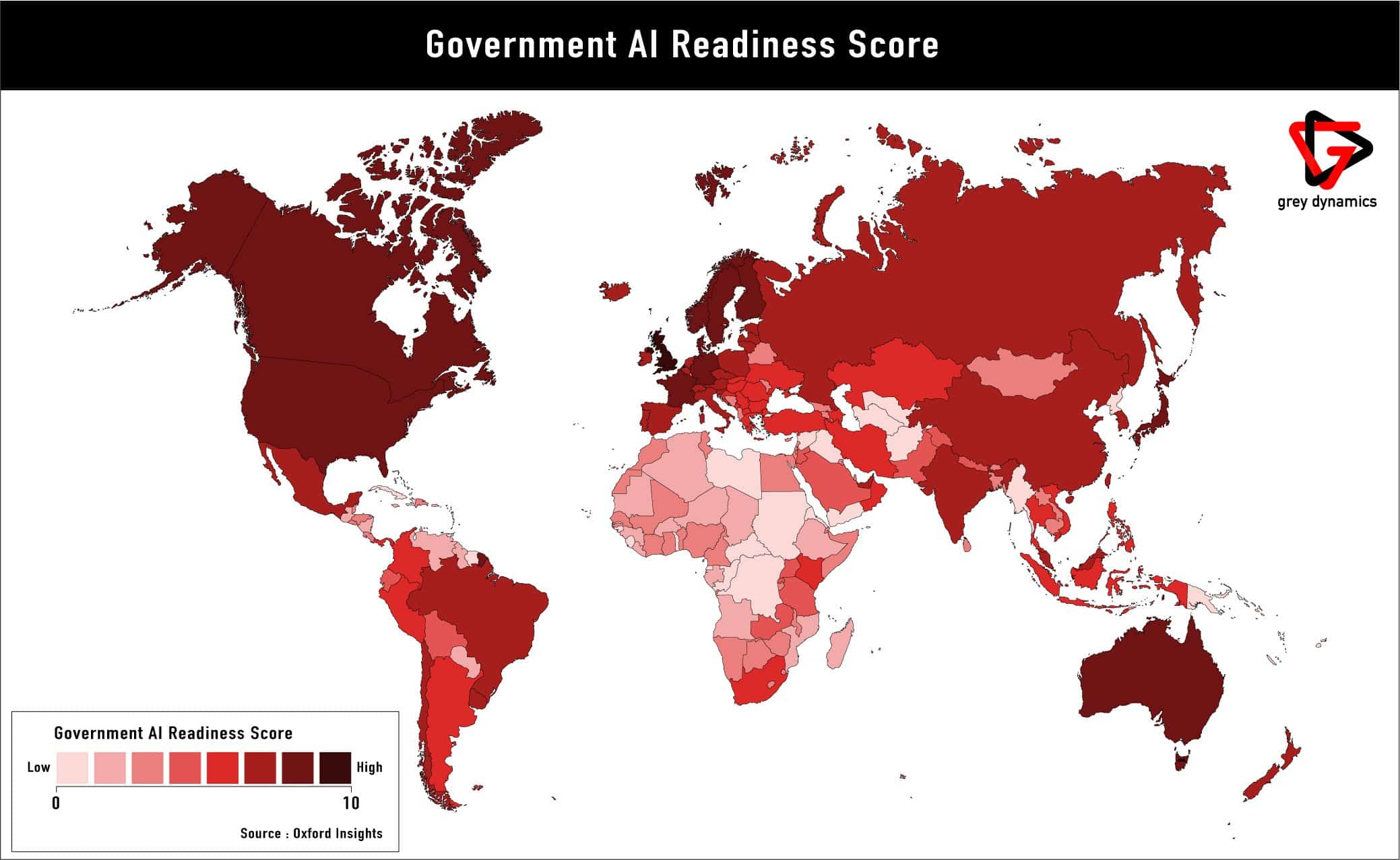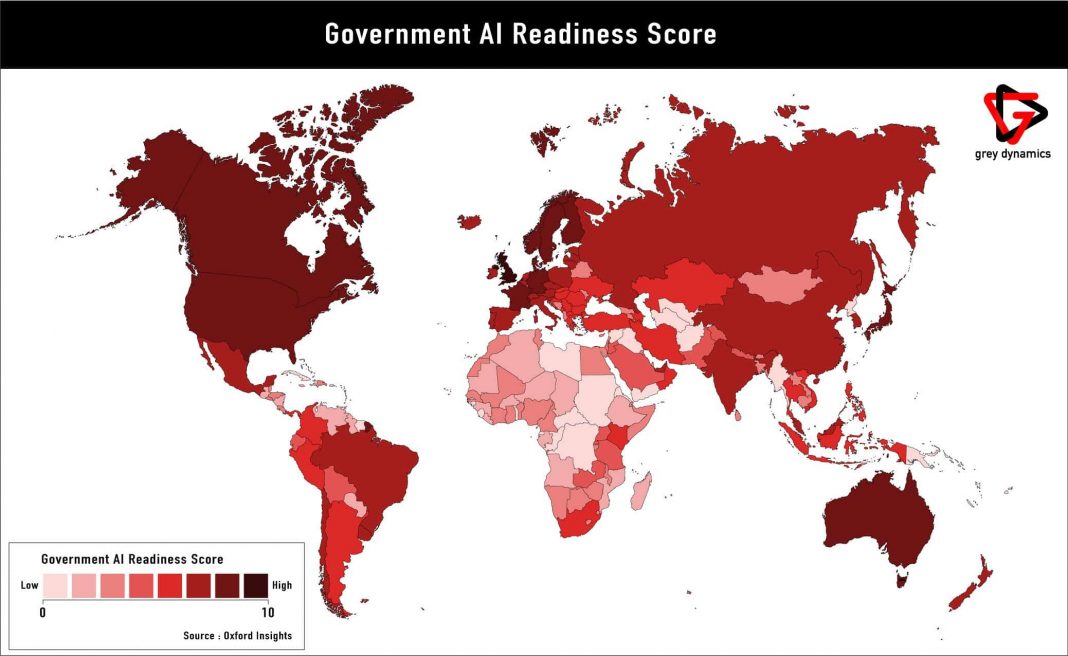Artificial intelligence (AI) is part of a technological development that will heavily impact humans in the very near future. This development is labelled as the Fourth Industrial Revolution, a combination of AI, Internet of Things, blockchain, 3D printing and other enabling technologies will in a short space of time revolutionise the human experience. The adaption of Th AI revolution could be extremely beneficial for Africa and its place in the world. Unfortunately, there are some worrying realities that must urgently be addressed to avoid Africa falling behind, which this Grey Dynamics article seeks to explore.
- By 2030, AI will add $15.7 Trillion to global GDP.
- Africa has 7 of the world’s10 fastest-growing economies, and by 2100 Africa will be home to 3 of the largest cities in the world (Lagos, Kinshasa, Dar Es Salaam).
- The youth demographic is set to double to 225 million by 2055, but there is a skills gap in terms of enabling technology training and a shortage in digital infrastructure to take full advantage of AI.
- AI and other enabling technologies may be crucial to effectively target poverty, healthcare shortages, increasing agricultural prosperity while reducing the ecological footprint, of which climate change is affecting Africa the most.
However, there is hope. A growing community of African innovators and projects are bringing a Pan-African consensus to help realise this goal. A failure to do so will likely result in a ‘digital divide’ compared to other continents. The Government Artificial Readiness Index 2019 places Africa as one of the least ready regions, but, a recent surge of AI labs and research labs can change this. On the other hand, there are fears of loss of jobs and ethical framework for the Fourth Revolution. If the transformation is not correctly managed, this paints a worrying picture with dangerous implications for Africa.

Digital Divide?
Despite limitations, Africa is a connected continent that has the capacity to create algorithms and facilitate the integration of AI. IBM research offices in Kenya and South Africa are creating opportunities for machine learning to access the African market. An AI lab in Ghana is working with Tanzanian farmers to develop a machine learning tool to diagnose early signs of crop disease, which works on phones and can revolutionise agriculture.
Google Africa’s head of AI, Moustapha Cisse stated that AI can help automate the diagnosis of diseases. With one physician per 5000 patients, this will be incredibly helpful to Africans. With a continent of 2000 languages, automated translations will be able to shape the connectivity and business capacity in the region.
- In April 2019, Google opened its first African research lab in Ghana.
- Ethiopia is launching an AI Development Centre, while a few months later Addis Ababa hosted its first AI conference.
- The robotics lab iCog, founded by 19-year-old Ethiopian Betelhem Dessie became first AI lab involved in developing Sophia the robot.
- IBM Research Africa is using AI to find the best method for eradicating malaria.
- The ICT sector has created 1.7mn jobs in Africa, with a $144bn economic value and $15.6bn tax revenue for the public sector.

There is a lack of training available in Africa for the use of enabling technologies, resulting in a lower readiness for firms to capitalise on the opportunity. However, if this is solved a digital divide can be avoided. AI is already slowly being implemented in Ethiopia to help practitioners diagnose cervical cancer and other abnormalities. In Kenya, blockchain has expanded access to credit for many. AI start-up ‘My Intelligent Machines’ is developing algorithms for genomic precision, facilitating intelligent breeding programs to tailor crops and reduce the ecological footprint. Africa is slowly adapting to AI but must face the issues in skills gaps and increase digital infrastructure.
Devil in the Detail
There are universal fears not limited to Africa regarding fears of job losses and AI surpassing human intelligence. As technology develops, a universal ethical framework is needed to avoid negative results from the Fourth Industrial Revolution. There is a possibility of the AI misinformation being used by non-state and state entities for unethical purposes. With the help of China, Zimbabwe is already collecting facial imagery that will be ideal for suppressive tactics against opposition once AI is integrated.
With the growth of oppressive regimes in Africa, this is a dangerous prospect. Cyber-intelligence gathering with AI creates unprecedented opportunities to target opposition. There is also a risk of state/non-state actors having a lower cost of violence. Automated small arms and AI-powered drones create potential terrorism problems that must be addressed.
With proper guidance and implementation, the negative factors of AI can be reduced even if it is not fully avoided. Africa has much to benefit from the Fourth Revolution and there are positive signs that adjustments will be made. A well-managed AI adoption can benefit African people in an unprecedented way. Failure to do so has the disastrous implications of a digital divide, which has the potential of worsening existing problems. Time will tell.

